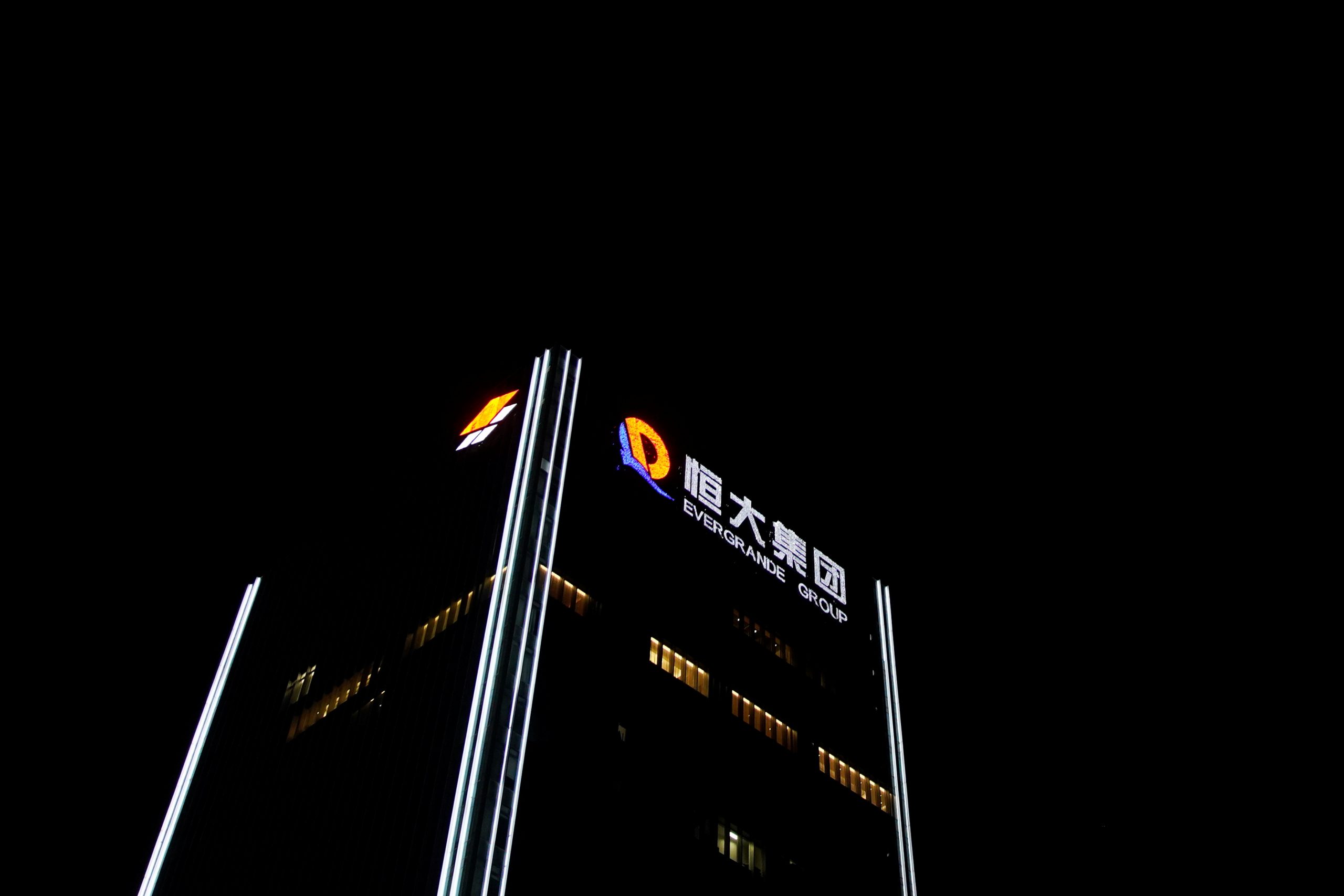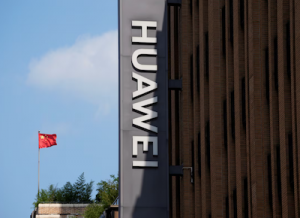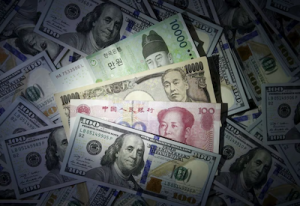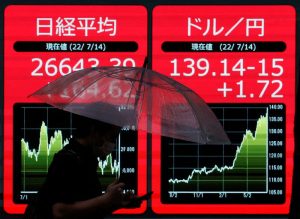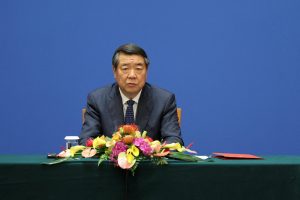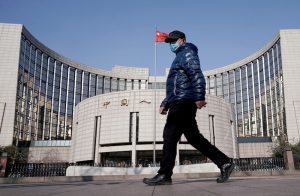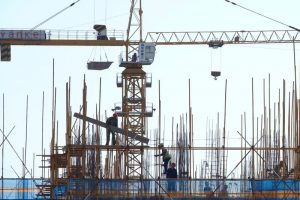China Evergrande Group missed paying bond interest due on Wednesday, two bondholders said, even as the cash-strapped company made a partial payment to some onshore investors.
Evergrande, reeling under a debt pile of $305 billion, was due on Wednesday to make a $47.5 million bond interest payment on its 9.5% March 2024 dollar bond, after having missed $83.5 million in coupon payments last Thursday. Some offshore bondholders had not received interest payments or any communication by the end of Wednesday New York time, people familiar with the matter said. They declined to be identified due to the sensitivity of the issue.
With liabilities equal to 2% of China’s GDP, Evergrande has sparked concerns its woes could spread through the financial system and reverberate around the world. The developer’s silence on its offshore payment obligations has left global investors fearing they will have to swallow large losses when a 30-day grace period ends for coupons that were due on Sept 23 and Sept 29.
LOCAL OBLIGATIONS
The company, once China’s top-selling developer and now expected to be one of the largest-ever restructurings in the country, has been prioritising domestic creditors over offshore bondholders. That’s at least in part to reduce the risk of social unrest. Its wealth management unit made a 10% repayment of wealth management products (WMPs) that were due by Sept 30, the indebted developer said on Thursday. The payment was made the same day and relevant funds issued to investors’ accounts, Evergrande said in a notice posted on its website. China’s central bank earlier vowed to protect homebuyers’ interests.
The lack of clarity on the company’s financial status sent its share price swinging wildly, at one point climbing as much as 5.2% and falling by as much as 7.2%. Evergrande Property Services Group fell 4.2% before trimming losses to 0.6% and China Evergrande New Energy Vehicle Group dived as much as 19.4%. It last traded down 8.6%.
A spokesperson for Evergrande did not have any immediate comment, and Reuters was unable to determine whether Evergrande had told any of the bondholders what it plans to do about Wednesday’s coupon payment.
“I can’t see there being much willingness to give a fairer outcome to offshore bondholders rather than onshore banks, let alone house buyers and people who have lent onshore through the personal loan structures,” said Alexander Aitken, a partner at Herbert Smith Freehills in Hong Kong. “Of course, legally there is also structural subordination from being offshore, which means lenders to Evergrande’s onshore subsidiaries get paid before lenders to the parent company or any offshore debt issuer.”
GOVERNMENT HELP
For Evergrande, “the most likely outcome is debt restructuring with some help from the government,” Wai Hoong Leong, portfolio manager for the KraneShares Asia Pacific High Yield Bond ETF, said in a presentation to investors on Wednesday. “We expect the government and Evergrande to focus on protecting the customers and suppliers, while ensuring an orderly restructuring for creditors who are likely to take a larger impact.”
It missed the payment deadline on a dollar bond last Thursday, a day after its main property business in China said it had privately negotiated with onshore bondholders to settle a separate coupon payment on a yuan-denominated bond.
In another move since then, Evergrande said in an exchange filing on Wednesday it would sell a 9.99 billion yuan ($1.5bn) stake it owns in Shengjing Bank to a state-owned asset management company.
The bank, one of Evergrande’s main lenders, demanded all net proceeds from the sale go towards settling the developer’s debts with Shengjing. As of the first half last year, the bank had 7 billion yuan in loans to Evergrande, according to a report by brokerage CCB International, citing news reports.
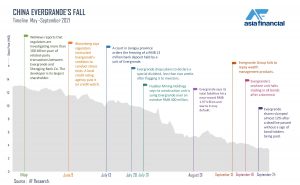
LIQUIDITY STRUGGLE
The move highlights the role state-owned enterprises may play in Evergrande’s denouement.
“We are in the wait-and-see phase at the moment. The creditors are organising themselves and people are trying to figure out how this falling knife might be caught,” an adviser hired by one of the offshore Evergrande bondholders said.
“The clock has started to tick on a restructuring process. The company is going to need to do something, it’s obviously struggling with liquidity … the liquidity issue is what brings the house of cards down.”
Once the face of China’s frenzied building boom, Evergrande has now become the poster child for a crackdown on developers’ debts that has spurred volatility in global markets and left large and small investors sweating on their exposure.
Evergrande’s troubles slammed global stock markets earlier this month, although some global investors have since shifted their focus to political wrangling in Washington over the US debt ceiling and a rise in Treasury yields that has pressured stocks.
GOVERNMENT PRODDING
Nonetheless, any negative surprise from Evergrande could give stock market bears more ammunition.
Rating agency Fitch on Wednesday downgraded the long-term foreign-currency issuer default ratings (IDRs) of Evergrande and its subsidiaries, Hengda and Tianji, citing likely non-payment of offshore bond interest last week.
Another report on Wednesday said that Marathon Asset Management is buying debt issued by Evergrande Group, citing the investment firm’s co-founder and chief executive officer, Bruce Richards.
Beijing is prodding government-owned firms and state-backed property developers such as China Vanke to purchase some of Evergrande’s assets, people with knowledge of the matter told Reuters.
Authorities are hoping that asset purchases will ward off or at least mitigate any social unrest that could occur if Evergrande were to suffer a messy collapse, they said, declining to be identified due to the sensitivity of the matter.
On Monday, China’s central bank vowed to protect consumers exposed to the housing market, without mentioning Evergrande in a statement posted to its website, and injected more cash into the banking system.
Those moves have boosted investor sentiment towards Chinese property stocks in the last couple of days, with Evergrande stock rising as much as 17% on Wednesday before closing 15% higher.
• Reuters with additional editing by Mark McCord and Jim Pollard




